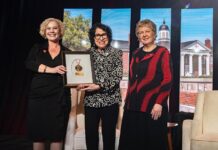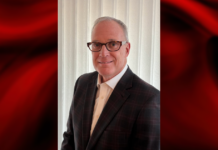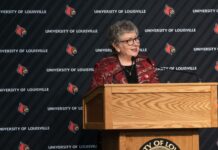
LOUISVILLE, Ky. – As young adults leave high school and become more independent, they may experience stress, difficulty sleeping and anxiety related to life choices, academics and new responsibilities. Koru Mindfulness is a meditation method specifically designed to help these emerging adults cope with these stresses.
At the University of Louisville, Koru Mindfulness classes have been available to students, staff and faculty for more than a year. To expand the opportunities for students, as well as staff and faculty, 15 individuals from UofL and more than 30 around the nation received Koru Mindfulness instructor training at the UofL School of Medicine. Over three days, the trainees advanced their understanding of Koru and practiced teaching it to others.
The course was led by Holly Rogers, M.D., founder of the Center for Koru Mindfulness and a psychiatrist at Counseling and Psychological Services at Duke University. Rogers and her colleague, Margaret Maytan, developed Koru Mindfulness to help the students she encountered in the counseling center at Duke. Rogers defines mindfulness as paying attention without judgment to the present experience, and she said it is a very important skill for emerging adults – anyone age 18-29.
“Mindfulness helps them get in touch with what is authentically true and meaningful so they can make these decisions not based on what their peers say, what the media says or what their parents say, but they can figure out what is meaningful to them,” Rogers said. “They are at a time of life where self-knowledge is really useful and mindfulness is most important for self-knowledge. I’ve been teaching Koru for 10 or 11 years. I have so many stories of students who come back and say, ‘This really changed my life.’”
Rogers and a researcher formerly at Duke, Jeffrey Greeson, Ph.D., conducted a randomized trial of 90 university students in 2012 and 2013 to determine Koru’s effectiveness in improving the students’ stress levels, sleep and self-compassion. Students who took the course reported less stress, better sleep, and improved self-compassion compared with those who had not yet attended the classes.
Rogers believes Koru appeals to individuals in this age group thanks to a relatively short program of four weekly classes of just 75 minutes. Although meditation has its origins in Buddhism, Rogers said Koru is a secular approach to mindfulness, and does not include a spiritual component. However, she said many students incorporate the techniques into their own spiritual practice.
The UofL School of Medicine hosted the training program in conjunction with “Being Well,” a multifaceted initiative for members of the UofL School of Medicine community that includes resources and programs to promote health, resiliency and compassion for oneself and others. Trainees included 15 faculty, staff and students from both campuses of UofL, as well as individuals from the University of Kentucky, Berea College and Bellarmine University in Kentucky, and from 13 other states and Canada.
Susan Sawning, M.S.S.W., director of Undergraduate Medical Education Research at the UofL School of Medicine, attended the instructor training after she found mindfulness personally helpful for fostering resilience and decreasing stress.
“Self-care is an essential part of leadership development and is important in each of our various roles. When we are not in tune with our wellbeing, it is very challenging to lead, to teach, to be fully present in our care for others,” Sawning said.
She hopes to teach mindfulness courses for faculty and staff as well as students in the school of medicine to help them cope with the stresses of varied obligations and the demands of medicine.
“A culture change is needed in medicine. We must cultivate an environment that promotes wellness and community. I am grateful to our leadership for making Being Well a top priority for our faculty, staff and students and am pleased to see Koru Mindfulness offered at our school of medicine,” Sawning said.


























